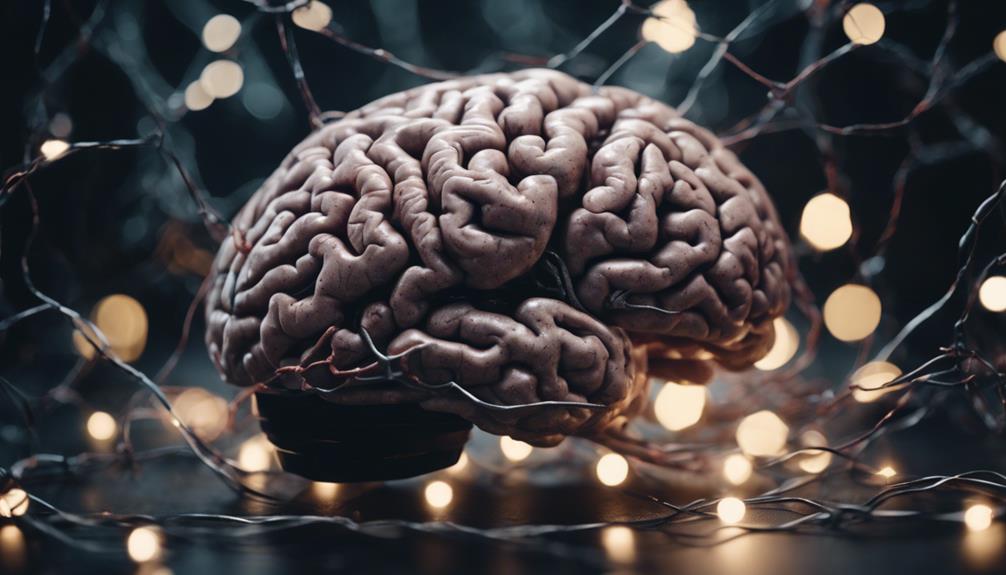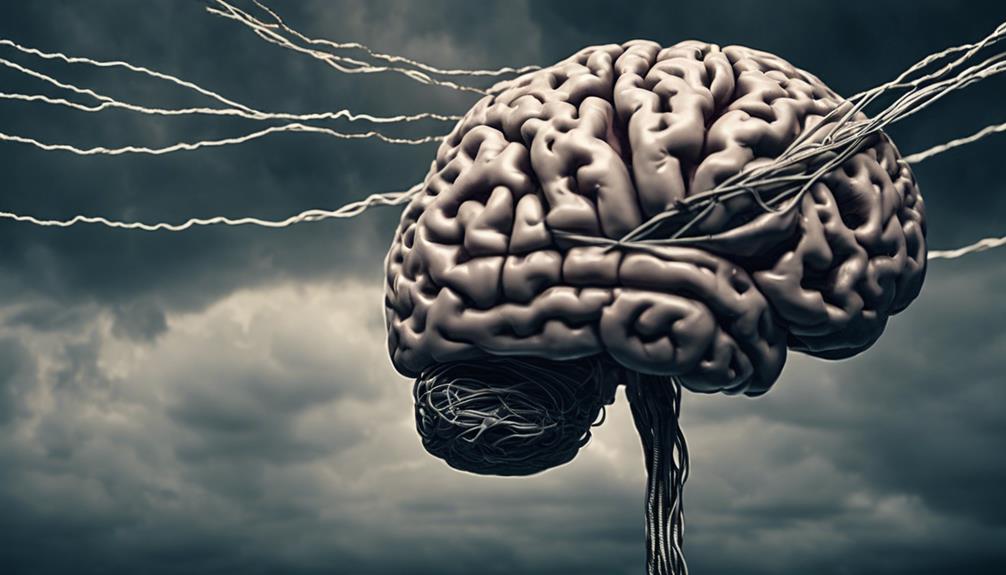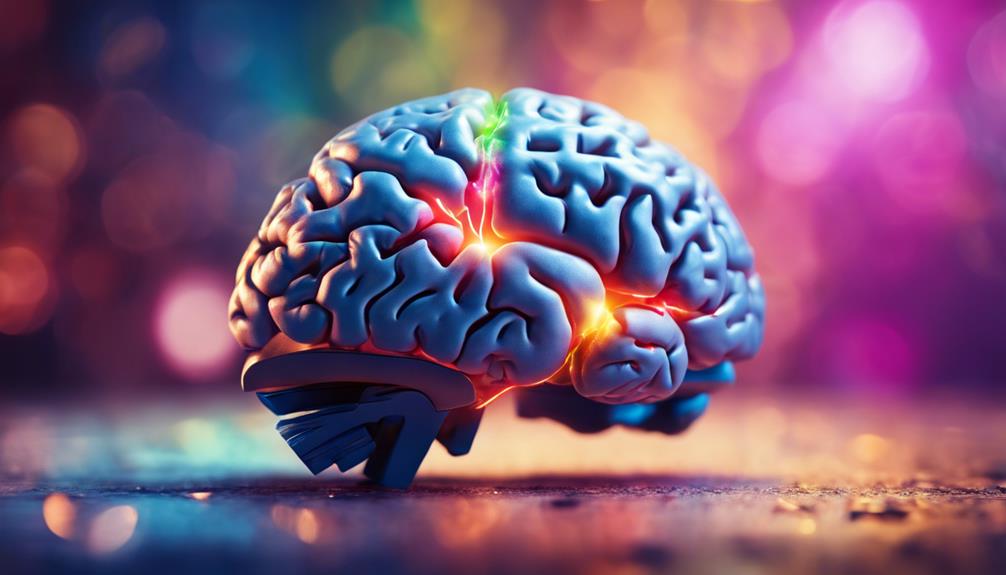Narcissistic abuse has a detrimental effect on the brain in various ways. Prolonged stress and elevated cortisol levels can damage cognitive function and memory, impacting the hippocampus. Individuals who have experienced this form of abuse may struggle with memory problems, forgetfulness, and difficulty concentrating. It can also impair decision-making abilities and impulse control, leading to poor judgment and a lack of risk evaluation. Emotional regulation may become challenging post-abuse, affecting impulse control and causing emotional outbursts. Hypervigilance can trigger heightened fear responses and increased anxiety. The continued presence of elevated cortisol levels can further harm the hippocampus, impacting cognitive function. Recognizing these consequences is crucial for seeking proper support and interventions. Further insights on this issue can offer a more comprehensive understanding of the lasting effects of narcissistic abuse.
Key Takeaways
- Narcissistic abuse elevates cortisol levels, damaging the hippocampus crucial for memory.
- Chronic stress impairs cognitive function and memory, leading to forgetfulness and concentration issues.
- Victims struggle with altered decision-making, impulse control, and risk assessment abilities.
- Emotional distress worsens memory problems and cognitive impairments.
- Gaslighting contributes to anxiety, depression, and self-doubt, affecting emotional well-being.
Impact of Narcissistic Abuse on Memory
Narcissistic abuse can have detrimental effects on memory, often leading to impaired cognitive function and memory problems due to chronic stress and high levels of cortisol. When we experience prolonged stress from narcissistic abuse, our bodies release increased amounts of cortisol, a stress hormone.
This elevated cortisol level can damage the hippocampus, a crucial region of the brain responsible for memory formation and storage. As a result, individuals may struggle with memory issues, forgetfulness, and difficulty concentrating due to this impact on the hippocampus. The emotional distress and traumatic experiences inflicted by narcissistic abuse can further exacerbate these memory problems, potentially leading to long-term cognitive impairments.
Recognizing these effects on memory and cognitive function is crucial to addressing them effectively. Seeking support, therapy, and engaging in stress-reducing activities can help mitigate these challenges and support overall brain health in the face of narcissistic abuse.
Altered Decision-Making Abilities

Narcissistic abuse can greatly impact decision-making abilities by changing key cognitive functions in the brain. Victims may struggle with evaluating risks, controlling impulses, and adapting to changing situations.
These impairments can lead to difficulties in making sound judgments and rational choices, affecting various aspects of their lives.
Impaired Risk Assessment
Impaired risk assessment due to narcissistic abuse can greatly impact decision-making abilities in victims. When a person is subjected to narcissistic manipulation, their ability to accurately evaluate risks becomes compromised. This can lead to poor judgments and a heightened vulnerability to further harm.
To address this issue effectively, victims must focus on rebuilding their risk assessment skills. Here are four key points to take into account:
- Seek support from trusted individuals or professionals to gain perspective.
- Practice mindfulness and self-reflection to enhance awareness of potential risks.
- Establish clear boundaries to protect oneself from further abuse.
- Engage in therapeutic activities to develop healthier decision-making patterns.
Poor Impulse Control
Our ability to make sound decisions and control impulses can be greatly impacted by the effects of narcissistic abuse on the brain. When experiencing narcissistic abuse, alterations in the prefrontal cortex can disrupt our impulse control and decision-making abilities. This can manifest as difficulties in regulating impulsive behaviors, making rational decisions, and weighing consequences effectively.
The damage to the prefrontal cortex from prolonged exposure to abuse may lead to poor judgment, impulsivity, and challenges in controlling emotions. Consequently, impaired impulse control can have a profound impact on daily functioning, relationships, and overall well-being.
It's essential to recognize these brain alterations and seek support to enhance impulse control, make more rational decisions, and mitigate the lasting effects of narcissistic abuse.
Reduced Cognitive Flexibility
Experiencing narcissistic abuse can significantly hinder our ability to adapt to varying perspectives and make informed decisions due to the resulting reduction in cognitive flexibility. When our cognitive flexibility is compromised, we may struggle to contemplate different viewpoints or adjust to new circumstances effectively.
This emotional damage to the brain can lead to rigid thinking patterns, making it challenging to make sound judgments. To address these issues and rebuild our decision-making abilities, it's essential to engage in therapy and cognitive exercises aimed at enhancing cognitive flexibility.
Emotional Regulation Challenges

Victims of narcissistic abuse may encounter challenges in regulating their emotions, such as impaired impulse control and difficulty managing feelings effectively.
The significance of acknowledging these emotional regulation difficulties post-abuse is essential to begin the journey towards healing and developing healthier coping mechanisms.
Impaired Impulse Control
Impaired impulse control, a common challenge for individuals affected by narcissistic abuse, can greatly impact emotional regulation abilities. Victims of such abuse may find it challenging to manage their impulses effectively, leading to emotional dysregulation and impulsive reactions.
Here are four key points to contemplate regarding impaired impulse control in the context of narcissistic abuse:
- Brain Imaging Studies: Research has shown differences in neural pathways related to impulse control in those who've experienced narcissistic abuse.
- Emotional Outbursts: Impaired impulse control can manifest as sudden emotional outbursts due to difficulty regulating emotions.
- Impulsive Behaviors: Individuals may engage in impulsive behaviors as a result of compromised impulse control mechanisms.
- Cognitive-Behavioral Techniques: Therapy and cognitive-behavioral techniques can assist in restoring control over impulses and emotions.
Difficulty Managing Emotions
Struggling to manage emotions can be a significant challenge for individuals affected by narcissistic abuse, impacting their daily functioning and overall well-being. Emotional regulation difficulties arise from chronic stress and trauma, leading to mood swings, intense reactions, and impulse control issues. The amygdala, important for emotional processing, can become dysregulated due to the effects of narcissistic abuse. This dysfunctional emotional regulation may result in heightened anxiety, depression, and difficulty in handling daily stressors. Seeking therapy and employing coping strategies are essential steps to enhance emotional regulation skills and mitigate the impact of narcissistic abuse on the brain.
| Emotional Regulation Challenges | Effects |
|---|---|
| Mood swings | Heightened anxiety |
| Intense emotional reactions | Depression |
| Impulse control difficulties | Difficulty coping with stressors |
Hypervigilance and Fear Responses

Experiencing hypervigilance as a result of narcissistic abuse can trigger overactivation of the amygdala, leading to heightened fear responses in the brain. This heightened state of alertness can have a substantial impact on cognitive functions and emotional well-being, creating a cycle of distress and fear that can be challenging to break.
To address this issue effectively, individuals experiencing hypervigilance and fear responses should consider the following:
- Seek Support: Connecting with a therapist or support group can provide valuable tools and strategies to manage hypervigilance and fear responses.
- Practice Mindfulness: Engaging in mindfulness techniques can help regulate amygdala activity and reduce the intensity of fear responses.
- Establish Boundaries: Setting healthy boundaries in relationships can reduce triggers for hypervigilance and promote a sense of safety.
- Self-Care: Prioritizing self-care activities such as exercise, adequate sleep, and relaxation techniques can help regulate emotions and support overall brain function.
Cortisol Levels and Brain Function

Elevated cortisol levels, a stress hormone, can adversely impact brain function by damaging the hippocampus and reducing its size. When cortisol remains high for prolonged periods, it can lead to neuron loss in the hippocampus, affecting memory and cognitive function.
Additionally, the activation of cortisol in the amygdala can impair cognitive processes and contribute to emotional dysregulation. Chronic stress stemming from narcissistic abuse can notably impact the hippocampus, potentially causing atrophy and cognitive impairment.
These physiological changes can manifest as difficulties in memory retention, learning new information, and regulating emotions. It's essential to recognize the detrimental effects of elevated cortisol levels on the brain's structure and function, as this understanding can help individuals seek appropriate support and strategies to mitigate the damage.
Anxiety and Depression Symptoms

The emotional toll of narcissistic abuse often manifests in common symptoms like anxiety and depression, greatly impacting individuals' mental well-being. When dealing with these challenges, it's important to understand the following key points:
- Emotional Distress: Victims of narcissistic abuse frequently experience emotional distress, leading to heightened levels of anxiety and depression that can be debilitating.
- Hypervigilance: The constant fear and anxiety caused by the abuse can result in chronic hypervigilance, making individuals feel on edge and anxious even in seemingly safe situations.
- Gaslighting Effects: Gaslighting, a form of manipulation used in narcissistic abuse, can greatly contribute to the development of anxiety and depression by causing victims to doubt their own reality.
- Isolation and Trust Issues: Survivors often struggle with self-identity, trust issues, and feelings of isolation, which can worsen their anxiety and depression symptoms by amplifying feelings of worthlessness.
Seeking therapy and support is essential for managing and overcoming these challenges, providing a path towards healing and recovery from the effects of narcissistic abuse.
PTSD and Brain Changes

Prolonged exposure to narcissistic abuse can lead to post-traumatic stress disorder (PTSD) and trigger significant changes in the brain's stress response system. Chronic stress resulting from such abuse can have detrimental effects on the brain, particularly the hippocampus and amygdalae.
Research indicates that high levels of cortisol and PTSD symptoms can lead to a decrease in hippocampal volume among individuals who've experienced narcissistic abuse. The hippocampus, responsible for memory and emotional regulation, may shrink under the constant emotional distress caused by the abuse.
Additionally, the amygdalae, which play an important role in processing emotions, can become overactive due to the ongoing trauma, contributing to conditions such as PTSD, Complex PTSD, and panic attacks.
Understanding these brain changes is essential in recognizing the impact of narcissistic abuse on mental health and seeking appropriate support and interventions to address PTSD symptoms and restore healthy brain functioning.
Neurological Effects of Gaslighting

Gaslighting, a common tactic in narcissistic abuse, induces cognitive dissonance and confusion in the victim's brain. This manipulation technique involves the abuser denying the victim's reality, leading them to doubt their memory, perception, and even sanity. Here are four key points to understand the neurological effects of gaslighting:
- Gaslighting can trigger the fight-or-flight response in the brain, causing heightened stress and anxiety.
- Victims of gaslighting may experience changes in brain function and connectivity, impacting their emotional well-being.
- The constant questioning and denial of reality in gaslighting can lead to decreased self-esteem and self-doubt.
- Increased cortisol levels resulting from the fight-or-flight response can potentially harm the brain's stress response system, affecting overall health and well-being.
Understanding these effects is essential in recognizing the impact of gaslighting on the brain and emotional health.
Healing Process for Survivors

Starting on the journey of healing from narcissistic abuse involves embracing therapeutic support and engaging in self-care practices for survivors' emotional and psychological well-being. Establishing vital boundaries is essential in the healing process for survivors, as it helps in protecting oneself from further harm. Self-compassion plays a critical role in fostering self-esteem and self-worth, aiding in the recovery journey.
Seeking support from a therapist or a specialized support group can provide survivors with a safe space to process trauma and rebuild their sense of self. Coping strategies such as mindfulness, journaling, and engaging in activities that promote healing are beneficial tools for survivors to navigate their path to recovery.
Forgiveness, self-acceptance, and setting boundaries are key components of the healing process for individuals recovering from narcissistic abuse. By incorporating these practices into their lives, survivors can gradually work towards rebuilding their emotional and psychological well-being. Remember, healing takes time, patience, and a commitment to self-care and growth.
Frequently Asked Questions
What Happens to Your Brain After Narcissistic Abuse?
After narcissistic abuse, our brains can undergo significant changes. The stress and trauma from such experiences can impact our cognitive functions, memory, and overall brain activity.
Studies reveal differences in brain function and connections in those who've endured abuse. Over time, this prolonged exposure can alter both the structure and function of our brains.
Understanding these effects is important for tailoring effective treatment strategies to support survivors in their healing journey.
What Are the Signs That Someone Has Suffered From Narcissistic Abuse?
Signs of suffering from narcissistic abuse include low self-esteem, anxiety, depression, trust issues, and difficulties in functioning. Victims may struggle with setting boundaries, trusting others, and forming healthy relationships.
Recognizing manipulation tactics, seeking therapy, practicing self-care, and establishing support networks are essential for healing.
Emotional trauma, cognitive impairments, memory problems, and altered brain activity are common indicators of brain damage resulting from narcissistic abuse.
What Does Narcissistic Abuse Do to You?
Narcissistic abuse can have significant effects on individuals. It may lead to cognitive impairments, altered brain activity, and memory issues.
Brain imaging studies show differences in function and connectivity in abuse survivors. Prolonged exposure can impact brain structure and function, affecting cognitive processes.
Understanding these effects can help tailor treatments for survivors. It's essential to recognize and address the complexities of narcissistic abuse to support those who've endured such trauma.
Why Is Narcissistic Abuse so Traumatizing?
Narcissistic abuse is deeply traumatizing due to the constant emotional manipulation, gaslighting, and invalidation experienced by victims.
The unpredictability and inconsistency of the abuser's behavior create fear and anxiety, leading to chronic stress.
The lack of empathy and support exacerbates feelings of isolation and worthlessness.
This toxic cycle can have lasting effects on mental health and well-being, making it essential to seek proper support and therapy to heal and recover.
Conclusion
To sum up, narcissistic abuse can have a profound impact on the brain, affecting memory, decision-making, emotional regulation, and more.
Studies show that up to 80% of survivors of narcissistic abuse experience symptoms of PTSD, highlighting the serious consequences of this type of trauma on mental health.
It's important for survivors to seek support and professional help in order to heal and recover from the damaging effects of narcissistic abuse on the brain.











